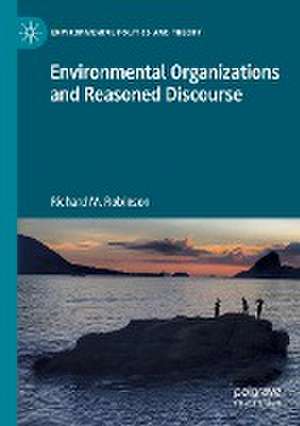Environmental Organizations and Reasoned Discourse: Environmental Politics and Theory
Autor Richard M. Robinsonen Limba Engleză Paperback – 7 iul 2022
context of our institutions for environmental decision processes. The book
reviews the roles of our “environmental advocacy organizations”—such as The
Sierra Club, The Audubon Society, the Environmental Defense Fund—in providing
and ensuring that our discourse and decisions are fair and reasoned according to
the criteria of being (i) inclusive of input from all affected, (ii) informed of relevant
scientific and socio-economic information, (iii) uncorrupted by direct conflicts of
interest, and (iv) logical according robust review by uncorrupted judges. These
organizations are described and examined as expressions of “collective imperfect duty,” i.e. the coordinated duties with environmental direction. The current state
of our discourse is examined in light of this fairness criteria, particularly in
consideration of the cross-border problems that threaten tragedies of the global
commons.
| Toate formatele și edițiile | Preț | Express |
|---|---|---|
| Paperback (1) | 891.33 lei 6-8 săpt. | |
| Springer International Publishing – 7 iul 2022 | 891.33 lei 6-8 săpt. | |
| Hardback (1) | 896.52 lei 6-8 săpt. | |
| Springer International Publishing – 6 iul 2021 | 896.52 lei 6-8 săpt. |
Preț: 891.33 lei
Preț vechi: 1086.99 lei
-18% Nou
Puncte Express: 1337
Preț estimativ în valută:
170.63€ • 175.58$ • 143.84£
170.63€ • 175.58$ • 143.84£
Carte tipărită la comandă
Livrare economică 01-15 martie
Preluare comenzi: 021 569.72.76
Specificații
ISBN-13: 9783030756086
ISBN-10: 3030756084
Ilustrații: XXII, 358 p. 12 illus., 3 illus. in color.
Dimensiuni: 148 x 210 mm
Greutate: 0.45 kg
Ediția:1st ed. 2021
Editura: Springer International Publishing
Colecția Palgrave Macmillan
Seria Environmental Politics and Theory
Locul publicării:Cham, Switzerland
ISBN-10: 3030756084
Ilustrații: XXII, 358 p. 12 illus., 3 illus. in color.
Dimensiuni: 148 x 210 mm
Greutate: 0.45 kg
Ediția:1st ed. 2021
Editura: Springer International Publishing
Colecția Palgrave Macmillan
Seria Environmental Politics and Theory
Locul publicării:Cham, Switzerland
Cuprins
Part I: Introduction: The Issues to be Confronted.- Chapter 1: The Normative Elements of Our Social Discourse and the Environmental Issues to be Confronted.- Part II: The Philosophy of Environmental Duty.- Chapter 2: Our Reasoned Environmental Discourse and Derived Duties: Constructivism as a Moral Process.- Chapter 3: Recognizing Environmental Duties.- Chapter 4: The Philosophy of Community and the Environmental Ethic.- Part III: The Rhetoric of Environmental Discourse.- Chapter 5: Some Rhetoric of Environmental Equity and Economic Efficiency.- Chapter 6: The Environment as an Input to Production and as a Provider of Amenities.- Chapter 7: Reaching Unbiased and Stable Environmental Decisions Through Fair and Reasoned Discourse.- Part IV: The Necessities for and Contributions of Our Environmental Organizations.- Chapter 8: Human Caused Climate Change and Its Deniers.- Chapter 9: Duty, Environmental Advocacy Organizations, andthe Commons.- Chapter 10: The Current State of Environmental Discourse: Is it “Fair” or Otherwise?.- Chapter 11: Some Environmental Organizations and Their “Fair and Reasoned” Contributions.- Chapter 12: Common Property Resources and the Making of the Global Tragedy.
Notă biografică
Richard M. Robinson is Professor of Business at SUNY Fredonia, USA, and
the author of The Imperfect Duties of Management (2020), and numerous
peer-reviewed scholarly journal articles ( Journal of Business Ethics, Journal of
Economics and Finance, Journal of Financial Research, and many other scholarly
journals). He earned his PhD in Economics from the University of Oregon, USA.
the author of The Imperfect Duties of Management (2020), and numerous
peer-reviewed scholarly journal articles ( Journal of Business Ethics, Journal of
Economics and Finance, Journal of Financial Research, and many other scholarly
journals). He earned his PhD in Economics from the University of Oregon, USA.
Textul de pe ultima copertă
This book explores the meaning and role of “fair and reasoned discourse” in the context of our institutions for environmental decision processes. The book reviews the roles of our “environmental advocacy organizations”—such as The Sierra Club, The Audubon Society, the Environmental Defense Fund—in providing and ensuring that our discourse and decisions are fair and reasoned according to the criteria of being (i) inclusive of input from all affected, (ii) informed of relevant scientific and socio-economic information, (iii) uncorrupted by direct conflicts of interest, and (iv) logical according robust review by uncorrupted judges. These organizations are described and examined as expressions of “collective imperfect duty,” i.e. the coordinated duties with environmental direction. The current state of our discourse is examined in light of this fairness criteria, particularly in consideration of the cross-border problems that threaten tragedies of the global commons.
Richard M. Robinson is Professor of Business at SUNY Fredonia, USA.
Richard M. Robinson is Professor of Business at SUNY Fredonia, USA.
Caracteristici
Helps to define fairness in environmental discourseUses Kantian constructivism and Rawlsian extensions to provide an ethical-philosophical empirical Considers the role of environmental coalitions (NGOs) in reasoned discourse














